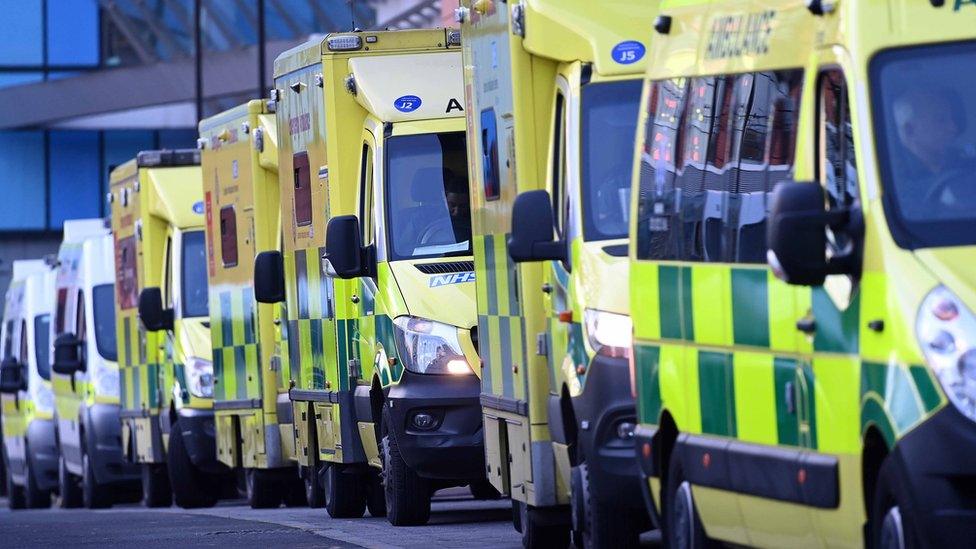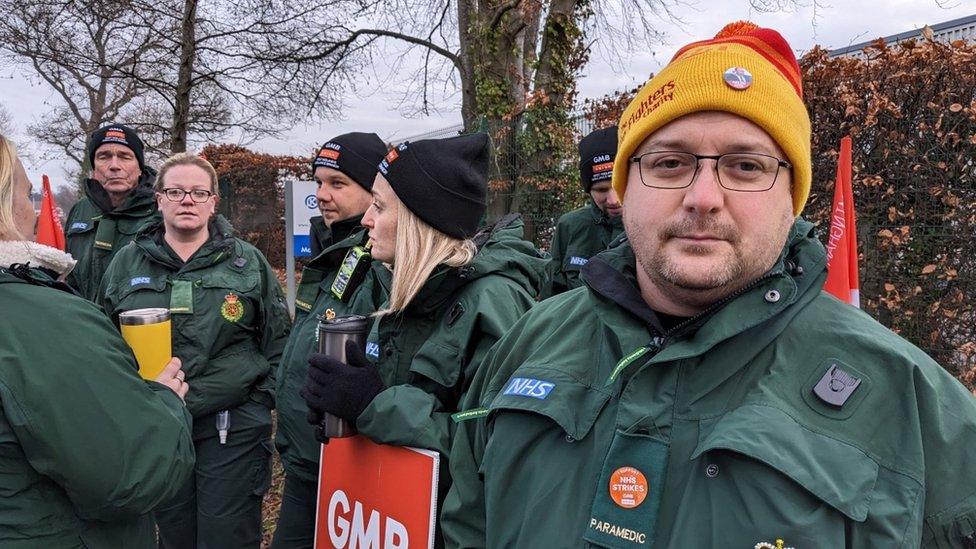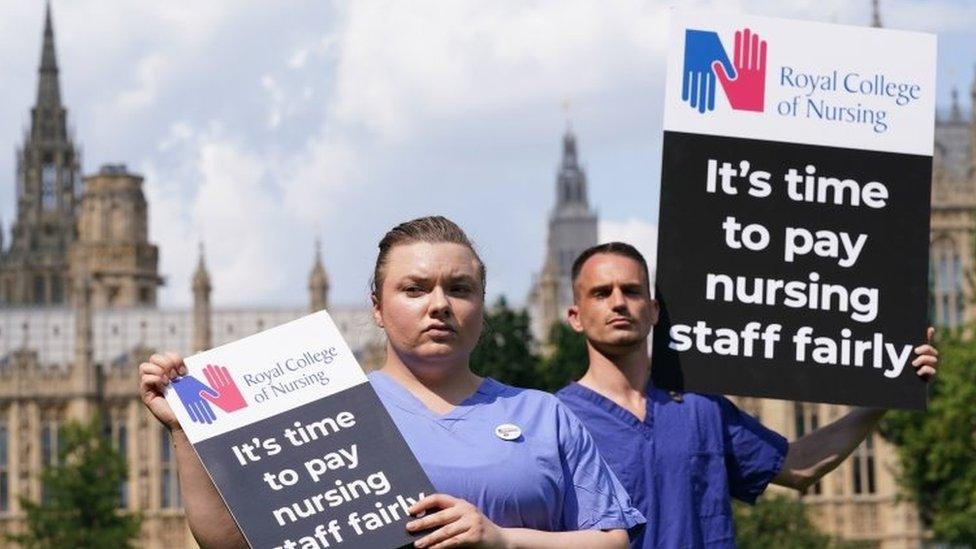Ambulance staff on strike in England and Wales
- Published

Ambulance staff belonging to three unions - GMB, Unison and Unite - are on strike in a dispute over pay.
Life-threatening 999 calls will be attended to but other emergencies, such as slips on icy pavements, may not be, as freezing temperatures affect parts of the UK.
The UK Health Security Agency has extended the current level 3 cold weather alert until 9am on Friday.
The cold carries health risks, particularly for vulnerable patients.
It increases the risks of heart attacks, strokes and chest infections, as well as falls and accidents, for example.
During this period, it is important to check in on family, friends and relatives who may need help, experts say.
If you have a pre-existing medical condition or are over the age of 65, it is important to try and heat your home to at least 18°C if you can.
Ambulance strike
BBC Breakfast asked Unite general secretary Sharon Graham whether it was right to go on strike on a day when weather conditions might make accidents more likely.
She said ministers had been warned that industrial action was inevitable unless they talked with unions about how to invest in the workforce.
She said: "We've got a workforce crisis going on across the NHS and that's manifesting itself most acutely in the ambulance service.
"None of those people who are out on strike want to be there. They want to be doing the jobs that they love and those jobs are just being compromised on a day-to-day basis."
One paramedic on a picket line today in Shropshire, Alex Kapitanec, said it was "soul destroying" not being able to do his job effectively.
"I know most of my colleagues have thought about leaving this job."

Alex Kapitanec said many crews striking would still respond to life threatening 999 calls
Health Secretary Steve Barclay said Monday's industrial action affecting some parts of England and Wales was "hugely disappointing" and despite contingency plans to mitigate risks to patient safety, "there will inevitably be further disruption".
He added: "I have had constructive talks with unions about this coming year's pay process for 2023-24, and am keen to continue talking about what is affordable and fair."
Unison general secretary Christina McAnea said a "solution" to the strike was "staring the government in the face".
The biggest day of industrial action for the NHS in this ongoing dispute over pay is set to happen on 6 February, when nurses will walk out too.
Governments say the above-inflation pay rises requested are unaffordable.
Pay rises are decided by independent pay review bodies.
NHS staff in England and Wales - including nurses - have already received an average increase of 4.75%. The lowest paid were guaranteed a rise of at least £1,400.
The Welsh government offered a one-off payment as a way to avoid strike action, but that was rejected by unions.
Fourteen health unions, representing more than a million NHS workers in England, have said they will no longer work with the NHS Pay Review Body on discussions about the next (2023-24) pay deal until their current demands are met.
In Scotland, a pay offer averaging 7.5% has been accepted by some unions.
In Northern Ireland, the government has said it will give a 4.5% uplift to pay, backdated to April 2022. That is a below-inflation increase for most workers. Pay disputes continue.
What 999 care will be provided?
The advice remains to call 999 in an emergency.
The most life-threatening situations - such as cardiac arrest - will be responded to by an ambulance.
Conditions which are serious but not immediately life-threatening might not be attended straight away.
Less urgent calls - such as a woman in late-stage labour - will not be prioritised.
Those who have a fall, or suffer other non-life-threatening injuries, are unlikely to receive 999 care. The NHS 111 service is available.

Which parts of the UK are affected?
Some ambulance staff in the GMB union are on strike in the West Midlands.
Meanwhile the action by Unison affects London, Yorkshire and the north-west, north-east and south-west of England.
Members of Unite are walking out in the West Midlands, East Midlands and north-west of England as well as in Wales.
Your device may not support this visualisation
Future strikes are also planned.
When are the next strikes?
Ambulance trust workers will be striking on:
Tuesday 24 January - GMB (North West) ambulance workers
Thursday 26 January - Unite (in Northern Ireland)
Monday 6 February - Unite (in North West, North East, West Midlands, East Midlands and Wales), plus GMB ambulance workers and nurses
Thursday 16 February - Unite (in Northern Ireland) plus GMB workers
Friday 17 February - Unite (in West Midlands and Northern Ireland)
Monday 20 February - Unite (in East Midlands, North East and Wales) plus GMB workers
Wednesday 22 February - Unite (in North West)
Thursday 23 February - Unite (in Northern Ireland)
Friday 24 February - Unite (in Northern Ireland)
Monday 6 March - Unite (in North West, North East, West Midlands, East Midlands and Wales) plus GMB workers
Monday 20 March - Unite (in North West, North East,West Midlands, East Midlands and Wales) plus GMB workers

What patients need to know
People seriously ill or injured, and whose life is at risk, should call 999 as usual, or call 111 for non-urgent care
Other services, such as some cancer treatments or urgent testing, may be partially staffed
More routine care is likely to be badly affected, including planned operations such as knee and hip replacements, community nursing services and health visiting
Anyone with an appointment not already rearranged should attend at their allotted time
GPs, community pharmacies and dentists will be unaffected

Will you take part in the strikes? Or will you be effected by strikes? Share your experiences by emailing haveyoursay@bbc.co.uk, external.
Please include a contact number if you are willing to speak to a BBC journalist. You can also get in touch in the following ways:
WhatsApp: +44 7756 165803
Tweet: @BBC_HaveYourSay, external
Please read our terms & conditions and privacy policy
If you are reading this page and can't see the form you will need to visit the mobile version of the BBC website to submit your question or comment or you can email us at HaveYourSay@bbc.co.uk, external. Please include your name, age and location with any submission.
Related topics
- Published2 May 2023
